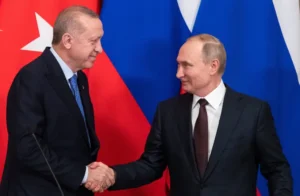Turkish President Recep Tayyip Erdoğan is set to be the first NATO leader to visit Russia since it invaded Ukraine.

Turkish President Recep Tayyip Erdoğan is set to be the first NATO leader to visit Russia since it invaded Ukraine when he visits President Vladimir Putin on Friday.
Both Russia and Turkey are heavily involved in Syria, with Moscow supporting the Assad regime and Ankara the Sunni Arab rebels. And Erdoğan has spoken recently of launching yet another incursion into Syria, in areas with a Russian military presence.
“What is clear is that the fact that it’s Erdoğan who is going to Sochi means it’s Turkey that wants something from Russia,” said Daria Isachenko, an expert on Turkey and Russia at the Berlin-based German Institute for International and Security Affairs.
“Most probably it’s about Syria.”
Daria Isachenko
Erdoğan will seek permission to carry out an offensive in Syria and discuss possible details, such as the area and how large it will be, Isachenko told The Media Line.
Kremlin spokesperson Dmitry Peskov said the two leaders would talk about defense cooperation, the Russian state news agency TASS reported on Wednesday.
Turkish Foreign Minister Mevlüt Çavuşoğlu said in a television interview in late July that his country does not seek permission for military operations.
Erdoğan has spoken in recent months about launching an incursion, later specifying his country would attack US-allied Kurdish militants in Tel Rifaat and Manbij in northwestern Syria, near the Turkish border.
Ankara says Kurdish forces in Syria are cooperating with the militant group the Kurdistan Workers’ Party (PKK), which has been engaged in an insurgency in Turkey for decades.
Turkey, the US, and the EU classify the PKK as a terrorist organization.
Iranian obstacle
One obstacle to the Kremlin accepting a Turkish incursion would be Iran, which has taken over some of the space left by Russia’s decreased presence in Syria since its invasion of Ukraine and has expressed opposition to Ankara’s plans.
Isachenko said both Iran and Turkey are important to Russia, which will have to accommodate both.
Since the invasion of Ukraine, Turkey has been trying to balance its desire to maintain ties with Russia with its condemnation of the Kremlin’s aggression.
Turkey has exercised its authority under the Montreux Convention, limiting Russian ships’ access to the Black Sea, located south of Ukraine.
While Erdoğan said that Russia’s “military operation” in Ukraine was “not acceptable” soon after it began, he added, “We see both Russia and Ukraine as our close partners.”
Turkey heavily relies on Russia as a source of energy, tourism, and trade.
Timothy Ash, an economist focused on Turkey and Ukraine, said that Erdoğan would want to get commitments from Russia to continue to provide cheap energy and to allow for the export of agricultural products from the country and from Ukraine.
This is “key for Turkey reducing its current account deficit and moderating pressure on [the] lira,” Ash wrote in a message to The Media Line.
A coordination center in Istanbul was opened on Wednesday to oversee the export of food cargo that has been trapped in Ukrainian ports since Russia’s invasion, after a deal was signed by the three countries and the UN on July 22.
The trapped grain led to rising food prices around the world, although skyrocketing inflation was something Turkey had been facing for many months before February.
Last year, Turkey’s lira lost 44% of its value against the US dollar. The currency is down another 25% so far in 2022.
Ash said that in return for such commitments from Russia, Putin would want to ensure Turkey does not impose sanctions on it and would hope Ankara would cut support given to Ukraine. Erdoğan has been moving closer to Putin for years, including purchasing the S-400 mobile surface-to-air missile defense system from Russia.
However, Turkey and Russia have historically not been allies and analysts warn that Erdoğan will likely still see Moscow as a threat.
With the two countries supporting opposing sides in Syria, Moscow could pose major risks to Turkey’s military and territory.
A Russian-backed attack on Syria’s Idlib region, where millions of internally displaced people now live near the Turkish border, could lead to a new flow of refuge seekers, and increase the domestic pressure that Erdoğan is facing due to intensifying anti-refugee sentiments.
However, the international backlash against Russia, which has seen wide-sweeping sanctions and some of the biggest companies in the world leaving the country, has strengthened the position of Turkey.
Isachenko said that despite some opposition from Moscow, she believes Turkey will go ahead with the offensive in Syria.
“It’s really a question of where Turkey will conduct the operation,” she said.
